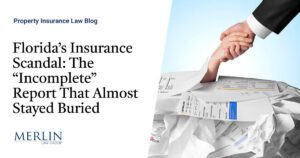Allegations that COVID-19 Virus Lives on Surfaces Adequately Alleges Direct Physical Loss or Damage
The California Court of Appeal reversed the trial court’s granting of the insurer’s demurrer and found the insured adequately pled a claim of direct physical loss or damage due to the presence of COVID-19. Mariana Pacific Hotel & Suites, LLC v. Fireman’s Fund Ins. Co., 2022 Cal. App. LEXIS 608 (Cal. Ct. App. July 13, 2022).
Fireman’s Fund issued a general property policy to the Hotel which provided coverage for direct physical loss or damage to the insured property. Business interruption coverage was extended for the actual loss of business income due to the necessary suspension of operations during the period of restoration arising from direct physical loss or damage to covered property.
The Hotel’s first amended complaint alleged, on information and belief, that “the presence of COVID-19 on property, including on and within Insured Properties, caused and continues to cause physical loss and/or damage to property by causing, among other things, a distinct, demonstrable or physical alteration to property.”
The first amended complaint further alleged, “A study by the Virology Journal showed that COVID-19 can survive on surfaces up to 28 days, serving as a vehicle for transmission during that time span.” The Hotel alleged that COVID-19 had been present in and before March 2020 on a variety of physical objects in the insured properties, including furniture, countertops, walls, bedding, appliances and food and other packaged items, as well as in the air. By government order, the Hotel had to be evacuated, decontaminated, or disinfected and one employee was ordered by the Department of Health to evaluate the hotel and quarintine. The physical loss or damage to property required the closure or suspension of operations at the Hotel.
Fireman’s Fund demurred to the first amended complaint, arguing the Hotel had failed to allege facts showing direct physical loss or damage to covered property. Fireman’s Fund pointed out that courts across the country had ruled the pandemic did not equate to physical loss or damage and argued loss of use alone did not constitute direct physical loss or damage.
The trial court granted Fireman’s Fund’s demurrer. The court relied on MRI Healthcare Center of Glendale, Inc. v. State Farm General Ins. Co., 187 Cal. App. j4th 766 (2010), which held “accidental direct physical loss required ‘an actual change in insured property then in a satisfactory state, occasioned by accident or other fortuitous event directly upon the property causing it to become unsatisfactory for future use or requiring that repairs be made to make it so.” The court explained, “[W]here the property has simply been rendered unusable based on a virus, rather than an external force, the loss of use of the property in a typical manner is not a ‘directly physical loss’ contemplated by the insurance policy.”
On appeal, the Hotel pointed to prior cases in which the Court of Appeal held a home had suffered physical loss or damage when the land underlying the home slid away, leaving the home standing on the edge of a newly formed cliff. In another case under a third-party liability policy, the existence of asbestos fibers on surfaces in a building constituted property damage.
The Hotel pleaded direct physical loss or damage to covered property within the definition articulated in MRI Healthcare – a distinct, demonstrable, physical alteration of the property. The Court of Appeal agreed. The firs amended complaint adequately alleged direct physical loss or damage within the MRI Healthcare definition. The court did not have to decided whether direct physical loss or damage could be shown without evidence of a physical alteration in the insured property.
The court recognized its conclusion was at odds with almost all decision considering whether business losses from the pandemic were covered. Federal case law, however, was not binding on the court. Further, the pleading rules were different in federal court when evaluating a trial court order sustaining a demurrer. To survive a motion to dismiss under the Federal Rules of Civil Procedure, “a complaint must contain sufficient factual matter, accepted as true, to state a claim to relief that is plausible on its face.” Ashcroft v. Iqbal, 556 U.S. 662 (2009). Under California law, however, the plausibility of the insureds’ allegations had no role in deciding a demurrer which required the court to deem as true, however improbable, facts alleged in a pleading.
Further, many prior cases, including Inns-by-the-Sea v. California Mutual Ins. Co., 71 Cal. App. 5th 688 (2021, involved allegations of loss of use of insured property as a result of government-ordered closures to limit the spread of COVID-19, rather than a claim the presence of the virus on the insured premises caused physical damage to covered property, which in turn led to business losses.
Because the insureds adequately alleged losses covered by Fireman’s Fund’s policy, they were entitled to an opportunity to present their case, at trial or in opposition to a motion for summary judgment.

